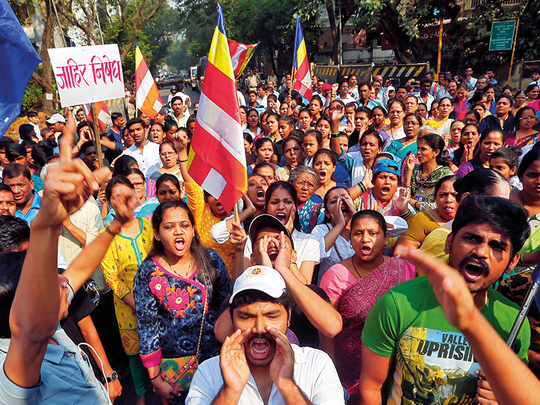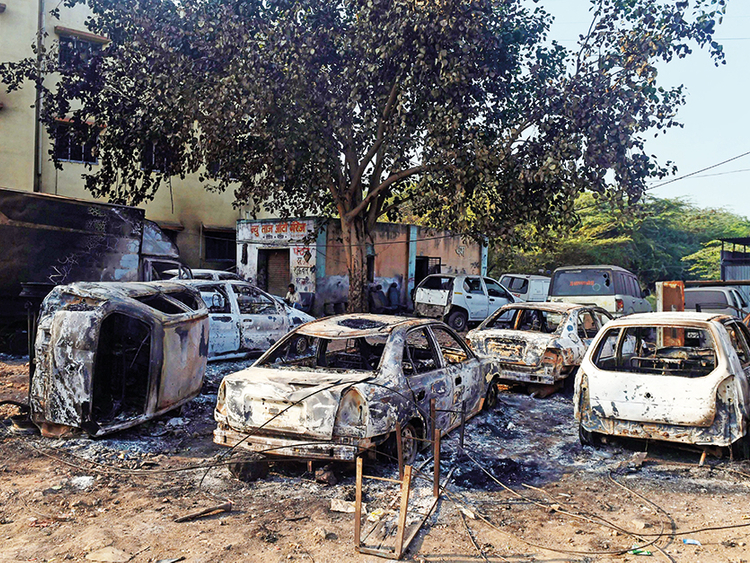
Mumbai: Last May, it was widely reported in Indian media that people belonging to Scheduled Castes (lower castes), in the Kushinagar district of Uttar Pradesh, were handed bars of soap and shampoo sachets by the local administration to presumably clean themselves ahead of a visit by the state’s new Chief Minister, Yogi Adityanath.
Barely two months later, India sent Ramnath Kovind — a member of the Dalit (backward caste) community — to Rashtrapati Bhavan (presidential palace) in New Delhi as the country’s 14th President.
Between these two extreme scenarios is trapped a rather sordid tale of oppression of the socio-economically marginalised classes in the world’s largest democracy — a tale that is only cynically punctuated by sporadic exercises in tokenism at best and state apathy at worst.
However, what has happened in the western state of Maharashtra over the last week bears a rather ominous sign of a simmering sense of deprivation getting on the boil and an almost militant urge to address an injustice that seems to have gone way beyond the purview of what mere tinkering with tokenism would entail.
As members of the Dalit community sought to commemorate a 200-year-old incident that they perceive to be a symbolic victory of the socially-marginalised community over the dominant class in 19th century Maharashtra, they were challenged by saffronite, rightist fringe groups whose interpretation of the same historical battle at Bhima-Koregaon was strictly in terms of hard-boiled nationalism. Dialectics of conflicting historical interpretation out in the open, with two groups at daggers drawn and unleashing an almost medieval rage that spilled over from the outskirts of Pune to the heart of India’s financial capital of Mumbai — with Dalit protesters holding a state’s administration to ransom for almost one whole day, resulting in the loss of at least one life and considerable damage to state and private property.
While Maharashtra government swung back into action and managed to contain the frenzy before it could spiral out of control, such flare-ups could occur again
Speaking to Gulf News from New Delhi on Thursday, Nandy cited a certain sense of political empowerment that triggered the Bhima-Koregaon and Mumbai clashes.
“It is rather ironical that the socially deprived class [Dalits] in India is suddenly feeling politically empowered. To understand this phenomenon, one ought to consider the fact that right now, there are so many states that have backward caste representatives as their chief ministers. Added to that of course is the even larger reality that the Prime Minister himself, Narendra Modi, is a member of the backward caste. And yet, the Dalits and other backward castes in India have remained far behind in terms of socio-economic upliftment. So, there has been a certain degree of political empowerment without any commensurate social or economic gains. As a result, it is only natural for this class to now demand it’s share of state benefits. And it is indeed unfortunate that no government has so far sought to address this disenchantment with sincerity,” Nandy explained.
Perhaps realising that there indeed is a huge vacuum in terms of the state’s
Speaking at a press conference in Mumbai on Friday, Jignesh took a swipe at Modi: “In cases of violence against Dalits, there has been no action. Modiji [Narendra Modi] should clear his stand. Why is he maintaining silence?”
Taking to his Twitter handle, Rahul said last Tuesday: “A central pillar of the RSS/BJP’s fascist vision for India is that Dalits should remain at the bottom of Indian society. Una, Rohith Vemula and now Bhima-Koregaon are potent symbols of the resistance.”
The BJP, in power at the Centre as well as in Maharashtra, rebutted the
While Nandy feels that this growing backward caste disenchantment is unlikely to fetch any immediate political gains to any specific political group, he, however, is of the opinion that in the long run, the issue of backward caste empowerment can help catalyse coalition politics. “Jignesh is trying to politically consolidate Dalit support not only in his home state of Gujarat, but across India and BJP will have to watch out for mobilisation of opposition forces in coming elections,” Nandy said.













